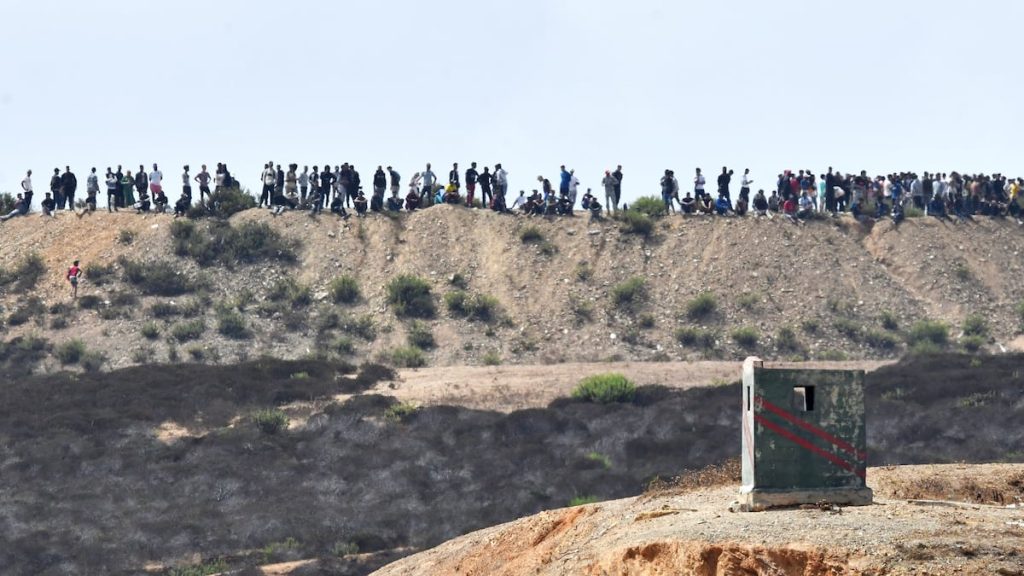A massive deployment of Moroccan security forces prevented hundreds of migrants from jumping the border fence with Ceuta on Sunday after a viral campaign to storm the autonomous city through social media in recent weeks. Morocco dispatched an unprecedented contingent of Gendarmerie and other security forces with hundreds of agents and vehicles, as well as eight boats, to the coastal town of Fnideq (Castillejos), bordering Ceuta, from Friday. Several buses were sent to the Tarajal crossing to transport the migrants who participated in the attempt to areas far from the Spanish border. Groups of people intending to arrive by swimming were also intercepted on the beaches of Castillejos (south) and Beliones (north). Despite raids in neighborhoods and villages, and barriers and checkpoints surrounding the North African Spanish city, between 200 and 400 young Moroccans and individuals from Islamic and sub-Saharan countries reached the security fence near the Berrocal estate around 11am, where large scale crossings have occurred in the past. The Civil Guard also deployed numerous riot control officers in the Spanish part until the incident was controlled after noon. Border queues and delays at the Tarajal border checkpoint lasted for more than three hours due to security checks and controls. The risk of a significant influx of migrants forced the intermittent closure of border facilities for nearly 15 minutes, according to government sources in Madrid.
The tension escalated on Saturday night into Sunday in Castillejos, where Moroccan security forces chased migrants and violent incidents with stone throwing were recorded, as shown in images shared on social media. Several residents contacted by phone reported that the coastal area of Fnideq has been fenced off for a week to prevent groups of migrants from swimming to Ceuta after bypassing the El Tarajal border breakwater, where hundreds of swimmers had been attempting to enter Spain irregularly every day since mid-August. Moroccan authorities have stated that during the past month, security forces have prevented 14,648 irregular migrants from breaking into the Spanish North African cities, swimming along the coast or jumping over land fences, representing nearly a third of all failed attempts to enter irregularly so far this year. In light of the recent events, the Spanish Ministry of Interior has reinforced the deployment of the Civil Guard with 40 agents, a helicopter, and drones in Ceuta, and a high-speed patrol boat has been sent to monitor the maritime division of Ceuta, government sources claim. Intervention police units remain on alert, while the Army awaits instructions in case its activation is deemed necessary. It is anticipated that migratory pressure will continue in the coming days, so the current reinforced deployment remains active, as reported by María Martín.
Moroccan authorities have increased surveillance at the Tarajal and Benzú breakwaters to thwart swimming entries, and at the Tarajal land crossing and perimeter fence, where the assault attempt occurred. Simultaneously, police control posts have multiplied on the roads in northern Morocco. Dozens of arrests have been made at locations such as the bus station in Tetouan and the train station in Tangier. In the recent days, at least 60 people had already been arrested for inciting and organizing a “massive illegal immigration operation” through social media in Ceuta. A dozen of the detainees were located in various cities in the North African country, where they encouraged entry into Ceuta on Sunday through platforms such as X, Facebook or Instagram, while the rest were intercepted upon arrival on trains and buses. Moroccan authorities have also reported that this week they deported 39 irregular migrants of Algerian and Tunisian nationality who were planning to enter Ceuta illegally.
The Moroccan General Directorate of National Security (internal intelligence service) is investigating the significant increase in messages on social media inciting entry into Ceuta and Melilla through “fake news.” One rumor allegedly encouraged taking advantage of the ending of the Strait Crossing Operation on the same Sunday, a massive flow of people in which 1.7 million passengers, mostly Moroccan immigrants in Europe, have been traveling by boat between Morocco and Spain for round trips over the past three months. Hundreds of people gathered on a hill near the border with Ceuta to attempt to cross into the Spanish city on Sunday.














